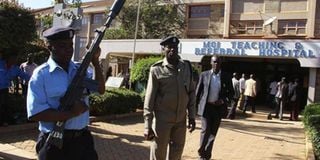Breaking News: At least 10 feared to have drowned in Makueni river
Herbert Ojwang tapes shine a light in dark corners of Kenya’s backroom deals

Police at the entrance of the Moi Teaching and Referral Hospital in Eldoret on January 26, 2015. FILE PHOTO | JARED NYATAYA |
What you need to know:
- Mr Odinga and Mr Ruto have denied any impropriety.
- Documents submitted to PIC this week show the nature of the relationship between Kenyan and Chinese firms.
Had it not been for a call to the Chinese embassy, allegedly from the office of the Deputy President, Herbert Ojwang figures that he would now be on the way to making Sh870 million.
That, according to an audio recording handed over to the National Assembly’s Public Investments Committee (PIC), is what was due to him for the idea to expand Eldoret’s Moi Teaching and Referral Hospital.
It would also have been his cut for linking China Wu Yi with powerful government officials who would have made the project happen.
But because he once worked for Cord leader Raila Odinga, long before he became Prime Minister, said Mr Ojwang, he was kicked out, lost the chance and last week became a whistle blower.
Sample this conversation: “The terms will remain the same. It is now to agree the DP ni ngapi anapata, our team ni ngapi tunapata, these guys on the parliamentary committee on Health lazima wapewe kitu, the Cabinet Secretary wa Health lazima wapewe kitu, Cabinet Secretary Finance …”
These would be the individuals or groups that would get a cut from the deal; the government officials to open doors and the parliamentary committees to keep the noise down.
When things appeared to have got too hot, and he sensed that he was going to be forced out, Mr Ojwang would remind his Chinese friends that he took them to Mr Odinga’s office, and that they gave him Sh5 million.
Mr Odinga and Mr Ruto have denied any impropriety, with the former Prime Minister and his allies accusing the Deputy President of dragging his name into the matter for political reasons.
On his part, Mr Ruto said he actually saved the taxpayer the burden of expanding the hospital at an exorbitant cost and has also accused the former Prime Minister of playing politics in the matter.
Mr Ojwang’s revelations offer a glimpse into the manner in which backroom deals are made as contracts are negotiated and the cost of bribes included in what the Kenyan taxpayer would eventually end up paying.
From the evidence he submitted to PIC, this would involve funded tours to China, numerous visits to the powerful people’s offices and the exchange of gifts.
Documents submitted to PIC this week on a separate, but also big contract, show the nature of the relationship between Kenyan and Chinese firms.
Among these is a “Consulting Service Agreement” between Reverof Consult International Limited and Sinohydro Tianjin Engineering Company Limited.
The agreement is made solely to enable the Chinese company “win, execute and perform the tender” with the Kenyan party playing the role of strategic adviser regarding the tender process.
It would also “promote Sinohydro amongst the employer (Kenyan firm with the job) and relative government authorities of Kenya as well as local engineering and construction companies to gain Sinohydro a positive position to pursue the tender.”
Reverof, which is registered in Dubai but represented by a Kenyan, would also handle the public relations and unexpected events in the course of the project.





